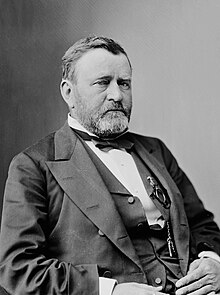Ulysses S Grant
| The Grant Cabinet | ||
|---|---|---|
| Office | Name | Term |
| President | Ulysses S. Grant | 1869–1877 |
| Vice President | Schuyler Colfax | 1869–1873 |
| Henry Wilson | 1873–1875 | |
| None | 1875–1877 | |
| Secretary of State | Elihu B. Washburne | 1869 |
| Hamilton Fish | 1869–1877 | |
| Secretary of Treasury | George S. Boutwell | 1869–1873 |
| William A. Richardson | 1873–1874 | |
| Benjamin H. Bristow | 1874–1876 | |
| Lot M. Morrill | 1876–1877 | |
| Secretary of War | John A. Rawlins | 1869 |
| William W. Belknap | 1869–1876 | |
| Alphonso Taft | 1876 | |
| J. Donald Cameron | 1876–1877 | |
| Attorney General | Ebenezer R. Hoar | 1869–1870 |
| Amos T. Akerman | 1870–1871 | |
| George H. Williams | 1871–1875 | |
| Edwards Pierrepont | 1875–1876 | |
| Alphonso Taft | 1876–1877 | |
| Postmaster General | John A. J. Creswell | 1869–1874 |
| James W. Marshall | 1874 | |
| Marshall Jewell | 1874–1876 | |
| James N. Tyner | 1876–1877 | |
| Secretary of the Navy | Adolph E. Borie | 1869 |
| George M. Robeson | 1869–1877 | |
| Secretary of the Interior | Jacob D. Cox | 1869–1870 |
| Columbus Delano | 1870–1875 | |
| Zachariah Chandler | 1875–1877 | |
Ulysses S. Grant (born Hiram Ulysses Grant; April 27, 1822 – July 23, 1885) was the 18th President of the United States (1869–77). As Commanding General (1864–69), Grant worked closely with President Abraham Lincoln to lead the Union Army to victory over the Confederacy in the American Civil War. He implemented Congressional Reconstruction, often at odds with President Andrew Johnson. Twice elected president, Grant led the Republicans in their effort to remove the vestiges of Confederate nationalism and slavery, protect African American citizenship, and support economic prosperity. His presidency has often been criticized for tolerating corruption and for the severe economic depression in his second term.
Grant graduated in 1843 from the United States Military Academy at West Point, then served in the Mexican–American War. After the war he married Julia Boggs Dent in 1848, their marriage producing four children. Grant initially retired from the Army in 1854. He struggled financially in civilian life. When the Civil War began in 1861, he rejoined the U.S. Army. In 1862, Grant took control of Kentucky and most of Tennessee, and led Union forces to victory in the Battle of Shiloh, earning a reputation as an aggressive commander. He incorporated displaced African American slaves into the Union war effort. In July 1863, after a series of coordinated battles, Grant defeated Confederate armies and seized Vicksburg, giving the Union control of the Mississippi River and dividing the Confederacy in two. After his victories in the Chattanooga Campaign, Lincoln promoted him to lieutenant general and Commanding General of the United States Army in March 1864. Grant confronted Robert E. Lee in a series of bloody battles, trapping Lee's army in their defense of Richmond. Grant coordinated a series of devastating campaigns in other theaters, as well. In April 1865, Lee surrendered to Grant at Appomattox, effectively ending the war. Historians have hailed Grant's military genius, and his strategies are featured in military history textbooks, but a minority contend that he won by brute force rather than superior strategy.
...
Wikipedia

